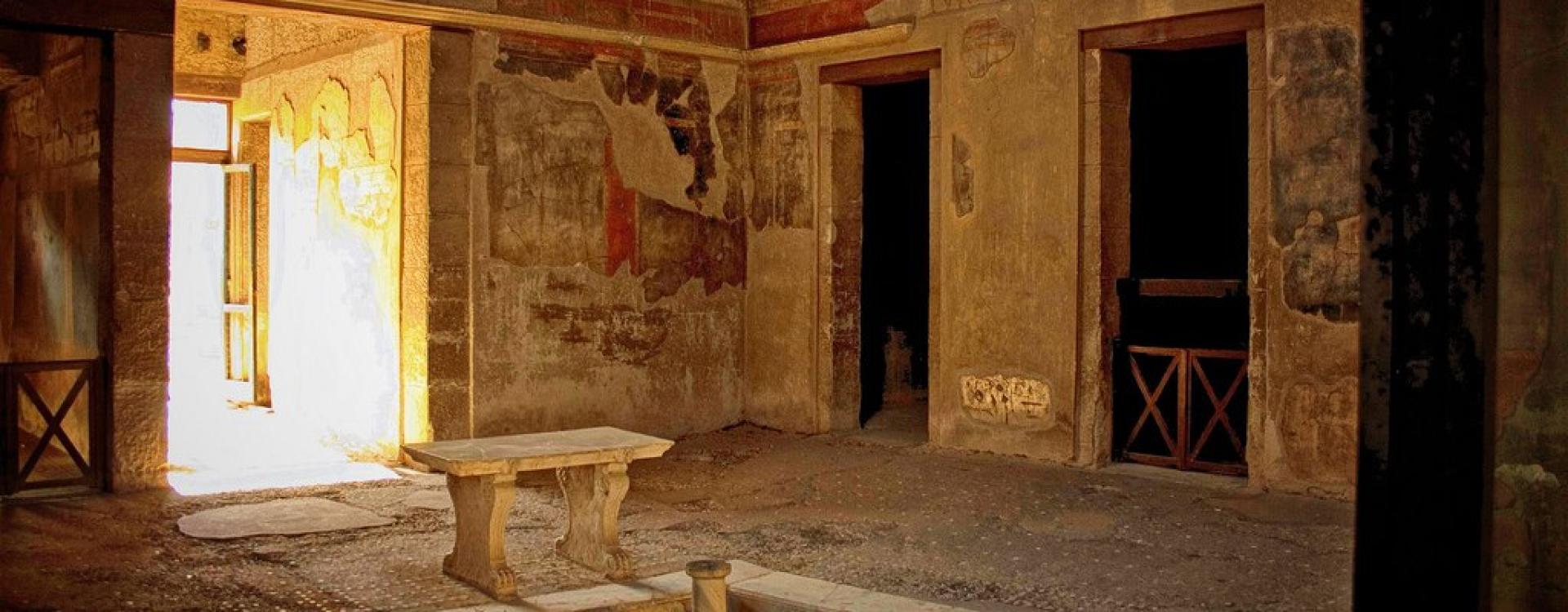Herculaneum
HERCULANEUM
Herculaneum is named for the mythical Greek god, Hercules, who, according the legend told by Dionysius of Halicarnassus, founded the city in 1243 BC. Historic analysis, however, suggests that the city was founded by the Oscans or the Etruscans in the 7th century BC , conquered by the Samnites in the 5th century BC. In 90 BC the city was dominated by Rome and transformed into a municipium. In the final years of the Roman Republic, Herculaneum reached the height of its splendor thanks to its coastal location, clean air, and mild climate, making it a popular resort town for many of Rome's patrician families. The city was vibrant and densely populated when the earthquake struck in 62 AD, causing serious damage; work to rebuild the city was still going on when the tragic eruption of Mount Vesuvius happened in 79 AD.
The cloud of toxic gases from the eruption wiped out the inhabitants, while the entire city was literally sealed under a flow of ash and volcanic rock 16 meters deep that solidifiedi, preserving almost perfectly intact organic remains like fabric, food, vegetation, and wooden structures.
The discovery of the ruins at Herculaneum was a complete accident: while a well was being dug in 1707 by order of Emmanuel Maurice, Prince of Lorraine, a number of marble fragments and statues that once decorated the ancient theater of Herculaneum were unearthed. In 1738, work began again under Charles III of Bourbon led by the Spanish military engineer De Alcubierre. In 1755, after a number of important discoveries were made, the Accademia Ercolanense was established, and was active until 1792. Excavations were suspended a number of times over the years until 1927, when the site began to explored in a more systematic way. Important artifacts were unearthed in the 1980s, along with sites like the Temple of Venus, the baths, and the ancient Greek port where the inhabitants tried to find refuge in 79 AD. The site has been home to intense excavation since 2000, especially around the Villa of the Papyrus and the library.
See all
Herculaneum is named for the mythical Greek god, Hercules, who, according the legend told by Dionysius of Halicarnassus, founded the city in 1243 BC. Historic analysis, however, suggests that the city was founded by the Oscans or the Etruscans in the 7th century BC , conquered by the Samnites in the 5th century BC. In 90 BC the city was dominated by Rome and transformed into a municipium. In the final years of the Roman Republic, Herculaneum reached the height of its splendor thanks to its coastal location, clean air, and mild climate, making it a popular resort town for many of Rome's patrician families. The city was vibrant and densely populated when the earthquake struck in 62 AD, causing serious damage; work to rebuild the city was still going on when the tragic eruption of Mount Vesuvius happened in 79 AD.
The cloud of toxic gases from the eruption wiped out the inhabitants, while the entire city was literally sealed under a flow of ash and volcanic rock 16 meters deep that solidifiedi, preserving almost perfectly intact organic remains like fabric, food, vegetation, and wooden structures.
The discovery of the ruins at Herculaneum was a complete accident: while a well was being dug in 1707 by order of Emmanuel Maurice, Prince of Lorraine, a number of marble fragments and statues that once decorated the ancient theater of Herculaneum were unearthed. In 1738, work began again under Charles III of Bourbon led by the Spanish military engineer De Alcubierre. In 1755, after a number of important discoveries were made, the Accademia Ercolanense was established, and was active until 1792. Excavations were suspended a number of times over the years until 1927, when the site began to explored in a more systematic way. Important artifacts were unearthed in the 1980s, along with sites like the Temple of Venus, the baths, and the ancient Greek port where the inhabitants tried to find refuge in 79 AD. The site has been home to intense excavation since 2000, especially around the Villa of the Papyrus and the library.
See all
AL MOMENTO NON SONO PRESENTI NEWS
